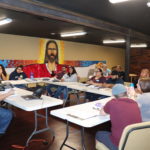Reasons some people fail to apply
new responses to old problems
– A. J. Mejorado
 As children and adolescents, we grow and navigate through the experiences of our youth with limited observability and capacity for understanding the whole picture. We walk through moments in our lives accumulating habits and responses to events, traumas, and situations, all the while unknowingly creating long-lasting responses that will influence us well into our adulthood. Sometimes these responses can be positive, but often, the result is harmful, self-destructive, and poor coping habits (IE: addictions, OCD, anger, depression, or avoidance). The goal for the Christian should be not only to modify these behaviors in practice, shifting them for healthier responses but a total transformation or “Renewing of the Mind” according to Romans 12:2.
As children and adolescents, we grow and navigate through the experiences of our youth with limited observability and capacity for understanding the whole picture. We walk through moments in our lives accumulating habits and responses to events, traumas, and situations, all the while unknowingly creating long-lasting responses that will influence us well into our adulthood. Sometimes these responses can be positive, but often, the result is harmful, self-destructive, and poor coping habits (IE: addictions, OCD, anger, depression, or avoidance). The goal for the Christian should be not only to modify these behaviors in practice, shifting them for healthier responses but a total transformation or “Renewing of the Mind” according to Romans 12:2.
In Matthew chapter 12, Jesus is ministering to others and preaching at the synagogue, casting out demons and speaking parables to the multitudes. After casting out a demon from a man and talking about the Holy Spirit, Jesus begins to instruct us about what it is to be filled with the Spirit and produce good fruit. In the passages following, Jesus teaches us how to create lasting change. Matthew 12:43-45 states “43 “When the unclean spirit has gone out of a person, it passes through waterless places seeking rest, but finds none. 44 Then it says, ‘I will return to my house from which I came.’ And when it comes, it finds the house empty, swept, and put in order. 45 Then it goes and brings with it seven other spirits more evil than itself, and they enter and dwell there, and the last state of that person is worse than the first.” What Jesus said in this passage is that unless we fill that empty house with the Holy Spirit, there will be that much more opportunity for it to be filled with evil once again.
Therefore, believers fail to have lasting change
and new responses because we lack the filling
by the Holy Spirit.
At a practical level, unless we replace old habits and responses with new ones, we are likely doomed to repeat the same behavior, regardless of how much we fight or white knuckle against the reaction we are trying to avoid. However, what Jesus is saying here takes that to an entirely new level in that we must be filled with the Holy Spirit so that there is no room for the enemy or demonic influence to draw us into sin. Creating practical and long-lasting habits that replace old ones is incredibly important, especially concerning addiction. However, this can only be successful if, along with it, there is a renewing of the mind.
To rebuild this foundation on something solid, we first need to discuss what effect the Holiness of God should have on the life of a believer. Many years ago, R.C. Sproul gave a lecture on holiness. In this lecture, he makes a connection between what we as Christians typically define as holy to be a synonym of “moral purity or righteousness.” He goes on to state, “In the Scriptures, there is one primary meaning and one secondary meaning of the term holy. The secondary meaning is that which refers to personal righteousness and purity. However, the word’s primary meaning is “separate,” or, if you will, theological apartheid. That which is holy is that which is other—that which is different from something else.” (N.D. Sproul)
So if the primary meaning of the word Holy in scripture is “that which is other” or “separate,” then we can continue searching through scripture to build out this image of God, and what we understand is that God is transcendent, superior, magnificent, and utterly different from us. We are a little bit like God (made in His image), but He is nothing like us. So, if God is nothing like us, what is he like?
There are many glimpses of God In the scriptures. However, one of the best ones comes from Isaiah 6, when Isaiah has a vision of the Lord. “In the year that King Uzziah died I saw the Lord sitting upon a throne, high and lifted up; and the train of his robe filled the temple. 2 Above him stood the seraphim. Each had six wings: with two he covered his face, and with two he covered his feet, and with two he flew. 3 And one called to another and said: “Holy, holy, holy is the Lord of hosts; the whole earth is full of his glory!” Several things are happening here in this passage. The first thing is that not only is God sitting on a high and lifted throne, but also the train of His robe is so immense magnificent that it fills the entire temple. The second thing here is an image of the seraphim. God created all things with a purpose, and we see here that each one has six wings. Two cover their face; two cover their feet, and with two, are flying. If we unpack this a little bit, we see that God is so holy, so magnificent, so “other-ly” that even the seraphim are unable to look at him in the face, as they have it covered by wings. The next thing we read is that they cover their feet as well. Scripture references many times the holiness of the inner sanctum of God. When Moses meets God, he removes his sandals because he is walking on is holy ground. Therefore, even the seraphim (who are eternally in God’s presence) cover their feet because of the Holiness of God.
When we have this mindset, we can employ
new responses and new habits to old
problems because the problems do not look
the same as they did before.
Now let us turn to Isaiah, who is a prophet that God has selected. Isaiah was a righteous man chosen to prophesy and speak out in the name of God to a people. Upon having a glimpse or vision of the Holiness of God, Isaiah responds in terror and said “Woe is me! For I am undone” (Isa. 6:5 NKJV). To save time, “Woe is me” is akin to passing judgment on himself. Anytime we read something like, such as “Woe to you,” it comes at a time of passing judgment from God. Therefore, what Isaiah is doing here is passing judgment upon himself in a sense or cursing himself. He’s coming apart because of the Holiness of God. In his lecture on the Holiness of God, R.C. Sproul says this “As soon as Isaiah sees the unveiled holiness of God, for the first time in Isaiah’s life, he understands who God is. And the very second that Isaiah understood who God was, for the first time in his life, he understood who Isaiah was.” It could not be more accurate in terms of both Isaiah’s experience and often our complete and utter lack of understanding of that very concept.
Who God is must be our foundation. A believer’s life and journey are long. He is constantly learning, understanding, and gaining illumination. We will continuously have pieces of God’s character revealed to us throughout our lives, whether through community, marriage, or parenting. However, one of the fundamentals in understanding the gospel and building a foundation is that actual change may affect the life of a believer in understanding the Holiness of God. To understand the Holiness of God is to not only understand who He is, but who we are in light of or in contrast to God and his Holiness. Therefore, to conclude, reason number one that we as believers fail to apply new responses to old problems and create long-lasting change is that we do not have a clear understanding of God and His holiness. Therefore, we do not know how to respond to that holiness.
So let us hop back to Matthew 12 and the parable that Jesus was speaking about here. The passages prior and following are about:
- The Holy Spirit
- Producing good fruit
- What that looks like in a believer’s life.
While Matthew 12:43 speaks about filling the empty home with something, and most importantly the Holy Spirit, I would like us to examine “The Parable of the Ten Virgins.” In this parable, Jesus starts by likening the Kingdom of Heaven to ten virgins “Then the kingdom of heaven will be like ten virgins who took their lamps and went to meet the bridegroom. 2 Five of them were foolish, and five were wise. 3 For when the foolish took their lamps, they took no oil with them, 4 but the wise took flasks of oil with their lamps.” (Mat 25:1-13) So here, we have ten seemingly identical virgins, except that five brought extra flasks of oil and five did not. In his lecture on the parable of the ten virgins, John Gerstner outlines the difference between “the wise virgins who have possessed faith, and the foolish virgins who have only professed faith.” John Gerstner hones in on several key issues, primarily the reality that many in the church are not saved despite professing and holding many values and practices common among believers. The critical component to this parable is the oil, which refers to the Holy Spirit. Therefore, the Parable of the Ten Virgins demonstrates that despite our professions of faith, if we need to be filled with the Holy Spirit and have a genuine love for God, we are no better than the foolish virgins, doomed to be locked out of the marriage feast. Why is this relevant or important concerning breaking old habits and creating new responses? As we stated earlier, transformation must occur by renewing our minds for these changes to be authentic and take root in our lives. Transformation requires a filling with the Holy Spirit because it is not by our doing that we are changed, transformed, and sanctified, but the work of the Holy Spirit in us.
So how do we know if we are filled with the Spirit? What are the markers of someone who has their lamp filled with oil? Galatians 5:22-23 explains to us, “But the fruit of the Spirit is love, joy, peace, patience, kindness, goodness, faithfulness, 23 gentleness, self-control; So according to scripture, those of us who are filled with the Spirit will produce this kind of fruit in their lives. According to Gerstner, love defines and separates those filled with the Spirit from those who are not. Gerstner states that the appearance of faith can even look like the following: Church Membership & Christian forgiveness, Orthodoxy, Giving, Prayer & martyrdom, and being the means of others salvation. However, just as the Pharisees had or practiced all of those things, without love, they were no better than the foolish virgins. 1 Corinthians 13:1 tells us, “If I speak in the tongues of men and of angels, but have not love, I am a noisy gong or a clanging cymbal. 2 And if I have prophetic powers, and understand all mysteries and all knowledge, and if I have all faith, so as to remove mountains, but have not love, I am nothing. 3 If I give away all I have, and if I deliver up my body to be burned,[a] but have not love, I gain nothing.
Therefore, believers fail to have lasting change and new responses because we lack the filling by the Holy Spirit. The Holy Spirit is what transforms us, influences us, and marks us as a new creation, not just with a new habit or a new response, but a wholly renewed way of looking at our lives. When we operate in love for God, we will find that besides the call to obedience but will desire it. As Jesus states in John 14:15, “If you love me, you will keep my commandments.” If we love God, we will desire and pursue obedience to His commandments.
There are many different reasons why believers might fail to apply new responses to old problems. However, the most fundamental reasons are the lack of actual change both in heart and in mind. Scripture commands transformation by renewing our minds. How can we genuinely renew our minds and have a genuine change of heart if we do not have a clear picture of ourselves as believers and who God is? When we understand who God is, we understand who we are and what our old habits and sins look like before the eyes and presence of a Holy God. With the filling of the Holy Spirit, we begin to see things differently. Sin no longer looks as appealing as it once did, and the Holy Spirit strives with us to bring us into a lifelong journey of sanctification. When we have this mindset, we can employ new responses and new habits to old problems because the problems do not look the same as they did before. The habits that we develop are rooted in the foundation of the Word and the Holy Spirit. Therefore, no longer are we fighting a fleshly problem with a fleshly response. Still, we are fighting a fleshly problem with an answer powered by the Spirit of God, rooted in scripture, and divinely powered to succeed.






